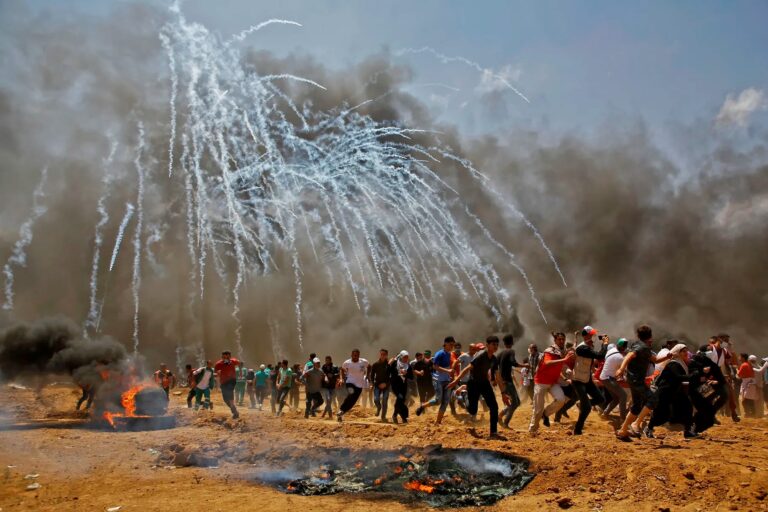Breaches
Hamas attacks southern Israel on October 7, and the world as we knew it cracked. So, now we spend our time counting breaches. Which ones will prove durable, which ones seismic?
Hard chore. Hard lessons learned from the 2011 revolts.
There is one breach I find myself constantly perusing. I have the sense that it will very likely deepen and rip through the toughest presumptions that have long frozen the Israeli-Palestinian mythos.
It is the Israeli hysteria that erupted in the aftermath of October 7 which first suggested a rupture bigger than we ever expected in a conception already under stress. It’s not the pain, shock, tears, and fury of the grieving families, but the frenzy that unfolded alongside them, gripping the Israeli nation itself.
It didn’t remind me of our hysteria here across the borders in the Levant: the hysteria of the vulnerable and the exposed, of the dispossessed and the helpless. The hysteria of those for whom loss and death had long become the markers of life itself, even if they have managed somehow to escape one or the other or both. I am not only referring to the Palestinian tragedy and Israeli culpability, but to so many tragedies besides, with us Arabs as victims and perpetrators alike.
In Israel is the hysteria of shattered delusions, of injured invincibility, of the mighty. And more. The searing memory of the horrors of the holocaust lurks in its shadows, of course. But also, so do the frightening fissures in that Iron Wall. The one that had long fenced the Israeli fortress, reassuring the people inside that they could ignore everything outside, even the terrors inflicted by the fortress itself on the besieged and occupied neighbors it controls. And that it could do it all and count on powerful friends totally indifferent to or accepting of unbearable human suffering not its own.
That’s why Ze’ev Jabotinsky’s famous 1923 essay of the same title has remained so remarkably current throughout the 100-year history of the struggle for Palestine. Among Zionism’s early advocates, Jabotinsky was the most blunt honest about its purpose and implications. Even as he insisted that it had a legitimate claim to the land, he understood very well that there was a very compelling counter-claim by the “Arabs of Palestine.”

In his essay, he acknowledged two essential facts and offered two cardinal insights. He stated to his readers that the Palestinians were not “a rabble, but a living people,” and every living people “regards its lands as its national home, of which it is the sole master, and it wants to retain that mastery always; it will refuse to admit not only new masters but, even new partners or collaborators.” The inescapable conclusion for Jabotinsky was that there can be no “voluntary agreement” with Palestinians, who will continue to resist “as long as there remains a solitary spark of hope that they will be able to prevent the transformation of “Palestine” into the “Land of Israel.”
Hence the imperativeness of the Iron Wall.
The Palestinians, true to Zabotinsky’s word, resisted, and, in 1948, Zionism won. It won the land cleansed of its people and achieved its Jewish majority.
But Jabotinsky opened his essay with two critical intuitions that have proved remarkably prescient:
First of all, I consider it utterly impossible to eject the Arabs from Palestine. There will always be two nations in Palestine – which is good enough for me, provided the Jews become the majority. And secondly, I belong to the group that once drew up the Helsingfors Programme, the programme of national rights for all nationalities living in the same State. In drawing up that programme, we had in mind not only the Jews, but all nations everywhere, and its basis is equality of rights.
Jabotinsky died in 1940. I don’t know what he would have counseled Israel to do after its first triumph in 1948 upon which it began to construct its Iron Wall. I don’t know what he would have counseled it after its conquest of the West Bank and East Jerusalem in 1967. But we know that his avid followers, including Benjamin Netanyahu, and successive Israeli leaders of all camps thought that building the Iron Wall would give them free license to trample on the plain facts Jabotinsky laid out for them.
And here we are in 2023, with Palestinians still very much “a living people,” an actual majority in the whole of Israel-Palestine, still colonized and occupied, and, yes, still resisting, sometimes brutally. They do so at a time when Israel is itself reeling from the pervasive corrosions that brutalizing another people invites. Its state is racist, its government is supremacist, and its settlers are armed, messianic, and murderous.

In the wake of October 7, Israel has joined the rest of us in the region in the constant dread we have as we move from one day to the next. There are serious consequences to failure. In the Levantine expanse, chronic upheaval has been our own penance for our failure in dismissing the hazards and opportunities of the postcolonial moment. We are largely broken states, from Iraq to Lebanon, because we all too quickly succumbed to our colonial deformations and then proceeded to enshrine them in our body politic and work them into our social fabric.
Israel told itself it was an entirely different story, and hence its delusion that it would escape the same fate. Its miraculous origins helped. So did the brilliance of its first generation of leaders; the indulgence of a very guilty West haunted by the Holocaust; a very close strategic alliance with the US since the early 1970s; an international Jewish community actively devoted to it; and the orphancy of the Palestinians, its victims.
Ironically, it was Yair Lapid, one of Israel’s so-called moderate leaders, who betrayed the absurdities of Israel’s conceits. In a reel that has gone viral, Lapid said that if the international media “tells both sides of the story…if it’s objective, it serves Hamas.” In other words, if the truth is told about the Palestinians, Israel loses.
The hysteria, then, that what Israel was sowing all along was not the stuff of eternal success but the seeds of imminent failure.
I join many others in expecting Israel to obsess about rebuilding the Iron Wall because without it, Israel would have to contend with irrefutable facts far beyond its ability to face and act upon. Gaza and its children, yet again, take the full brunt of a state as grotesquely unimaginative as it is morally bankrupt. My eyes, I am very sad to say, are also on the Palestinians of the West Bank and East Jerusalem.
Much worse days and years may lie ahead for us–and unavoidably for Israel.
****
On Another Note
Staying on Gaza this week as well. Ezra Klein Interviews Peter Beinart and Spence Akerman, Author of Reign of Terror. The three flesh out the repercussions of the October 7 assault, as Israel navigates the new realities.
And who would ever want to understand an issue without its deepest and most sensitive context? Here’s Fintan OToole’s “The Few and the Many” in the New York Review of Books on the very subject:
Civilized nations (of which Britain was the supreme example) did not have to grant their subject peoples the same rights and protections they claimed for themselves. Governments in London, writes Caroline Elkins in Legacy of Violence: A History of the British Empire (2022), “constructed an alternative moral universe for populations it perceived to be off civilization’s scale of humanity, in an otherworldly order distinctly their own.” If there are some respects in which the Israel-Palestine conflict can be seen as the most dangerously unfinished business of that empire, the question of whether the people of Gaza exist in an alternative moral universe is a living legacy of the British Empire’s governing mentality
